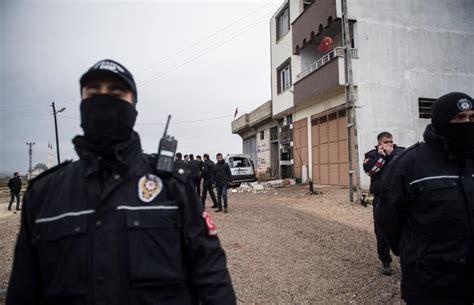
Türkiye arrests 48 with suspected ties to Daesh, church attack
Authorities have arrested 48 suspects with ties to the Daesh terrorist group in connection with a shooting at an Istanbul church in January, Interior Minister Ali Yerlikaya said on X on Saturday.
“In raids against the Deash terrorist organization, 48 suspects were captured, especially those connected to the perpetrators of the Jan. 28 attack on Istanbul’s Santa Maria Church, in which one person was killed and those in contact with the conflict zones,” Yerlikaya said.
The operations, code-named “Bozdoğan-21,” were carried out by the Istanbul and Ankara police departments in coordination with the General Directorate of Security Intelligence and Counterterrorism Department.
During the operations, 30 suspects believed to be involved in the Santa Maria Church attack were apprehended by the counterterrorism team from the Istanbul Police Department, while 18 others connected to Deash were arrested by the Ankara Police Department.
The Jan. 28 armed assault during Sunday mass on the Santa Maria Church in Istanbul’s Sarıyer district was claimed by Daesh. The attack resulted in the loss of 52-year-old Tuncer Cihan.
Türkiye has since ramped up operations against the terrorist group.
Daesh operates a so-called Khorasan Province (Daesh-K) network in Türkiye, which looks for new “methods” and recruits more foreign members for its activities after constant counterterrorism operations became a “challenge,” security sources say.
The National Intelligence Organization (MIT) thwarted the terrorist group’s efforts for recruitment, obtaining funds and logistics support after its latest operation in the aftermath of the church shooting.
Daesh remains the second biggest threat of terrorism for Türkiye, which faces security risks from multiple terrorist groups and was one of the first countries to declare it as a terrorist group in 2013.
In December last year, Turkish security forces detained 32 suspects over alleged links with Daesh, who were planning attacks on churches and synagogues, as well as the Iraqi Embassy.
Daesh extremists have not previously targeted places of worship on Turkish soil, but they have carried out a string of attacks, including against a nightclub in Istanbul in 2017 that left 39 people dead and a 2015 bombing attack in Ankara that killed 109.
Turkish airstrikes also target hideouts of Daesh in northern Iraq and Syria near the Turkish border.
Terrorists from Daesh and other groups, such as the PKK and its Syrian wing, the YPG, rely on a network of members and supporters in Türkiye. In response, Ankara has been conducting pinpoint operations and freezing assets to eliminate the terrorist groups at their roots. Türkiye deported 9,000 foreign terrorist fighters, mainly from Daesh, from 102 different nationalities, of which 1,168 are from the U.S. or European Union member countries, since 2011.
In the past nine months, Turkish police arrested 656 Daesh terrorists in countrywide operations and prevented 19 attack attempts, according to figures from Yerlikaya’s office.
The pattern of Daesh attacks raises questions about how they choose the countries they target, which don’t always include the Western world or the U.S. Most recently, the group attacked a Moscow concert hall and killed more than 130 people late last month.
Turkish authorities have accused the terrorist group of a “deep power focus of operating under the auspices of their subcontractors and carrying out their attacks with their orders.”
Between October 2022 and early 2024, Daesh killed 15 in an attack in Iran’s Shiraz, three others in an attack on a Chinese-owned hotel in the Afghan capital Kabul and 103 more during an attack on a commemoration ceremony for slain Gen. Qassem Soleimani on the anniversary of his killing, in Iran.
Source » dailysabah.com





